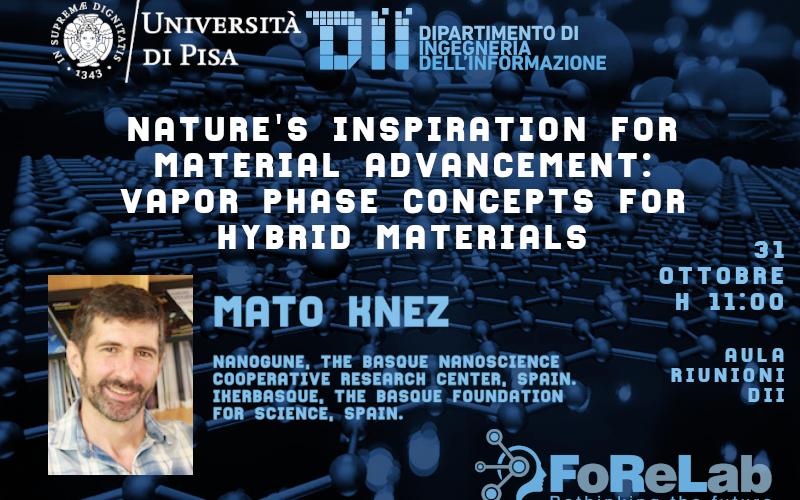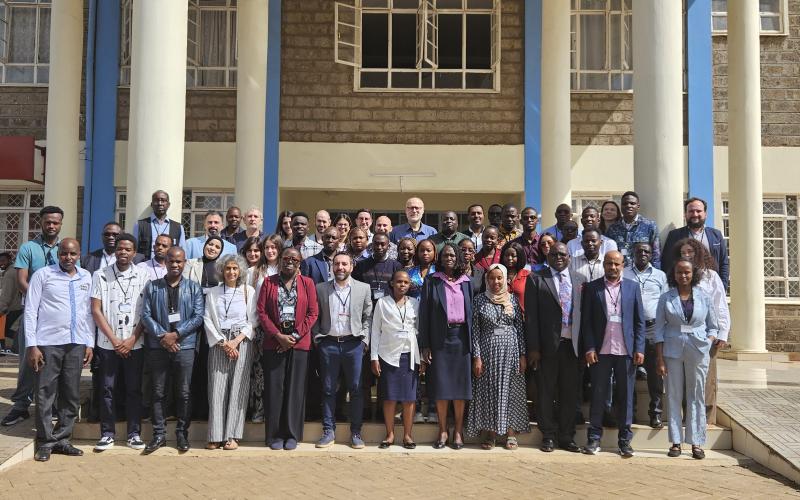In questi giorni il team di bioingegneri composto da Arti Ahluwalia, Carmelo De Maria e Chiara Belmonte si trova a Nairobi per tenere un corso intensivo nell'ambito del progetto Afra Moya, di cui il...
Leggi tuttoNature's inspiration for Material Advancement: Vapor Phase concept for Hybrid Materials

Meeting Room
Dipartimento di Ingegneria dell'Informazione
Via Caruso 16 Pisa
Ground Floor
Mato Knez
CIC nanoGUNE, Tolosa Hiribidea 76, Donostia-San Sebastián, E-20018, Spain.
IKERBASQUE, Basque Foundation for Science, Plaza Euskadi 5, Bilbao, 48009, Spain.
Email: m.knez@nanogune.eu
Abstract
Natural processes, often enduring, share a common goal: the advancement of structures and constructions. Exploring these natural concepts provides opportunities to enhance known materials and uncover new application possibilities. One intriguing natural concept involves hybridizing materials, merging organic and inorganic components to surpass the individual elements. The engineering of these hybrid materials can be achieved through synthetic wet-chemical or physical methods, with variations in resulting material properties, even when the composition remains identical, due to distinct interactions between components.
This talk will show some of our group's approaches towards vapor phase-grown hybrid films, extending their application beyond the microelectronics industry. We'll showcase examples where nanoscale coatings and infiltrations significantly improved the mechanical and electronic properties of polymeric materials. Additionally, we'll discuss innovative approaches to self-healing semiconducting thin films, enabled by these hybrid materials. In most instances, these processes modify the chemical or physical properties of the base material, typically enhancing them and introducing new functionalities.
Bio
Mato Knez studied chemistry and finished his doctoral degree in natural sciences at the Max-Planck Institute of Solid-state Research in Stuttgart (Germany). Thereafter he moved to the Max-Planck Institute of Microstructure Physics in Halle, where he led a junior research group. In 2012 he moved to CIC nanoGUNE in San Sebastian (Spain) for an Ikerbasque research professorship where he works until now.
He is also teaching at the Technical University of Navarra (TECNUN) and scientifically advising the startup company CTechnano.
His research focuses on thin films and hybrid materials obtained or functionalized by vapor phase processing such as ALD and CVD and related technologies including molecular layer deposition (MLD) and vapor phase infiltration (VPI), the latter one having been invented by his group. He received the Nanofutur award by the German ministry of education and research (BMBF) the Gaede Prize by the German Vacuum Society, was a Marie-Curie fellow and in 2019 he became honorary professor at the University of Rijeka (Croatia)



